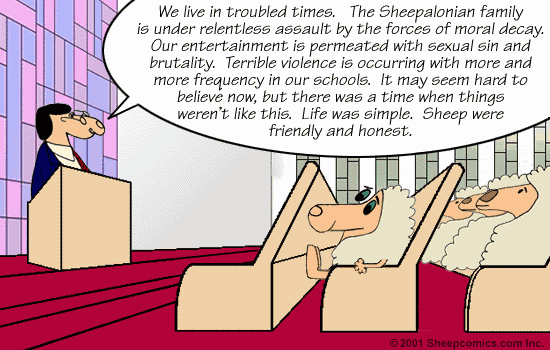
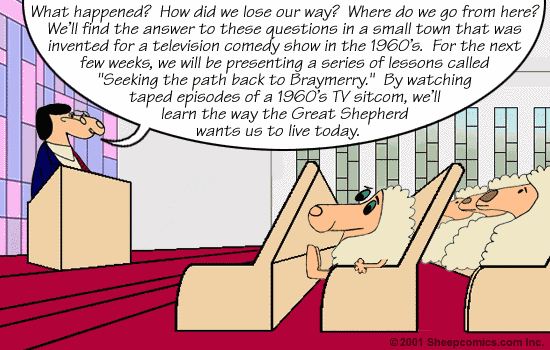
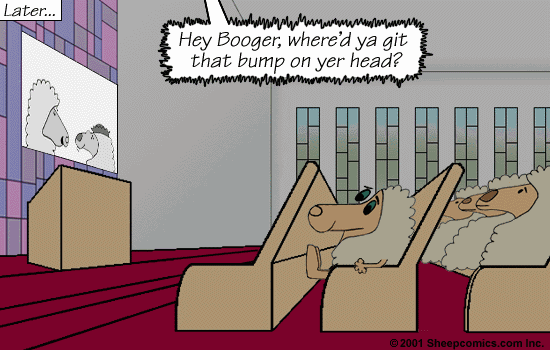
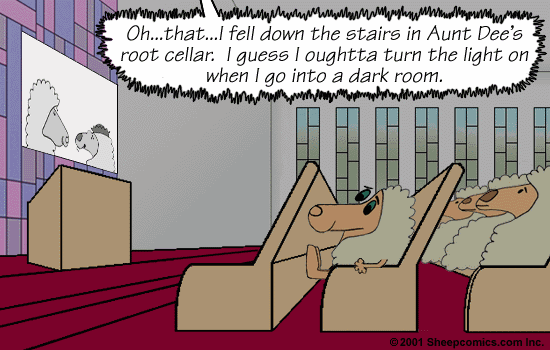
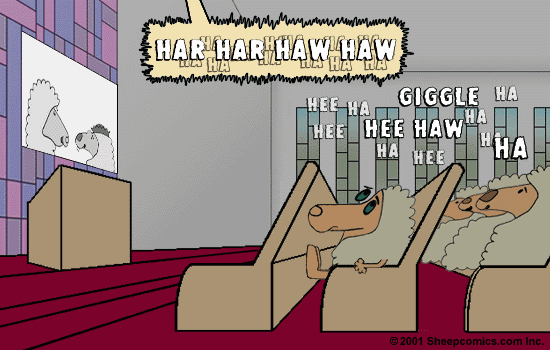
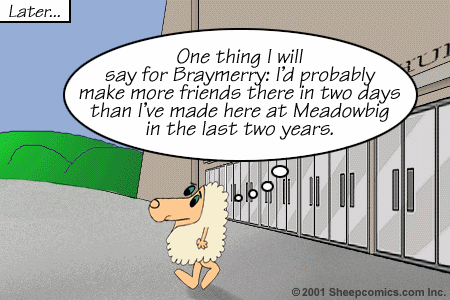
Editorial Notes
I think it was a little over a year ago that I first heard of what has become a national and cross-denominational bible teaching phenomenon. While visiting my house, a friend told me that the church he was attending was showing taped episodes of The Andy Griffith Show during its evening services as a way of teaching the bible.
If I was a cartoon character, my jaw would have dropped to the floor and my tongue would rolled out like a carpet. I simply couldnít believe it. People are going to church to watch The Andy Griffith Show? A sitcom from the 1960ís is being shown in church as an example of how we are to live and behave? Are they doing this just so that the preacher doesnít have to work to prepare a sermon for Sunday night? Why go to church to watch something thatís so easy to find on TV? (Easy to find if you have cable, anyway.)
(To read all about how episodes of The Andy Griffith Show are used to teach the Bible, Click Here.)
Immediately I knew I had premium fodder for a comic strip. The only problem was that I had never actually watched The Andy Griffith Show. About all I knew about the show was the trademark whistled theme music. When I was a child of about seven years old, my favorite shows were Leave it to Beaver and F-Troop. One of these must have been on right after The Andy Griffith Show. It seems I often tuned in just in time to see Andy and Opie walking along the stream while the closing credits were whistling by.
Thanks to the cable stations TV Land, and Nickelodeonís Nick at Nite, I quickly became "Andy Griffith literate", if not an expert. I didnít want to admit it to myself, but I actually enjoyed this show more than I thought it would. I can see why some believe it was the greatest sitcom of them all. But how does this help me with the Bible?
I must say that the Andy Taylor character is a classic example of someone who puts the spirit of the law ahead of the letter of the law. I wish more churches were led by men like Andy Taylor.
The Barney Fife character, on the other hand, seems to be little more than an insecure nut. To Barneyís credit, however, he did finally land a job at a police department in the "big city", and by his last visit to Mayberry he seemed downright competent.
Aunt Bee has got to be the most dysfunctional main character Iíve ever seen in a sitcom. Iíve only seen a fraction of the 249 episodes, but I can remember seeing two complete episodes that were built around keeping Aunt Bee from knowing the truth. In one episode, Aunt Bee leaves Andy and Opie home alone and they proceed to trash the house. Then they clean up the place so that Aunt Bee wonít see the mess. At the last minute, however, they decide that if the house is too clean, Aunt Bee wonít feel needed, so they trash the house again. In another episode, Andy concocts an elaborate scheme to keep Aunt Bee from ever learning just how awful her pickles really are.
In one of my favorite episodes (episode 238), the church that is attended by all the main characters receives an extra $500 to spend on whatever they want. Aunt Bee decides that the choir she sings with absolutely must have choir robes. The church is split into factions with each side wanting the $500 for themselves. One of the characters mentions the possibility of a church split! In this episode, Aunt Bee is a classic example of someone who "goes to church" all their life but cannot muster even a bit of Christian behavior when confronted with a relatively minor conflict. Why does she bother to go to church? She doesnít seem to have learned much.
In all fairness, the focus of "Mayberry Class" seems to be biblical behavior, not the virtues or flaws of the main characters. I donít think people are coming out of these classes thinking that they want to be like Barney Fife or Aunt Bee. The point seems to be the stories behind the episodes. They are morality plays. When we watch The Andy Griffith Show, we often see biblical teachings applied to resolve many of the situations the characters find themselves in.
So now I have a little more understanding of why people are going to church to watch episodes of The Andy Griffith Show. Personally, Iíd rather watch episodes of The Andy Griffith Show in church than sit through the programmed, impersonal monotony of the typical "worship service". Either way, Iím sitting in a room watching a show, but with The Andy Griffith Show it's OK to laugh.
What makes me still feel uneasy about all this, and a bit sad, is the idea that fully grown-up Christians need to be led through episodes of The Andy Griffith Show in order to learn something about biblical principles of conduct. Werenít these shows self-explanatory to their audience back in the 1960ís? Has society changed so much that this charming sitcom about lovably flawed individuals living in a small town now represents "heaven" more than Earth? Is The Andy Griffith Show so far from our reality that it has become a divinely inspired mystery that must be interpreted by clergymen? Thatís a little scary.
Another aspect of "Mayberry Class" that I find a little disturbing is this idea that we can "find the way back to Mayberry". Did Mayberry ever really exist? Were there ever towns of about 5000 people in the 1950ís and 60ís where there was so little crime that the sheriff needed only one deputy, and the deputy needed only one bullet? Did we Americans, at our biblical best, ever really create a society like that?
It seemed ironic to me that this idea that we can "go back to Mayberry" came from a group of churches that often claims to have gone "back to the 1st century" in their teachings and worship. If we could just "go back to" when things were perfect, we would be happy and life would be great. If the 1st century is too much of a stretch, we can settle for small town America of the 1950ís. Close enough. Besides, the people of early 1960ís America have left us instructional videos to show us how itís done.
Finally, I think that we miss a lot of what The Andy Griffith Show can teach us if all we do is write bible-study lessons around instances of the characters exhibiting biblical values. To me, the attractiveness of the "Mayberry life" isnít just in the biblical behaviors being demonstrated. Itís the community! The characters in this show are part of each-otherís lives all the time, not just on Sunday morning. They work, eat, and play together all day and every day. Their lives are intertwined. Everyone is an important part of the community. Even pumping gas is important when you work for the only gas station in town.
If church leaders want to show us the "way back to Mayberry", they could start by building their churches into communities, not just collections of people who believe the same things and sit through the same "worship service" in the same building on Sunday morning. Church leaders should help us help each other in our day-to-day lives and stop obsessing over weekly entertainment performances and somber, mind-numbing ceremonialism. I donít need a 25 minute speech about God every week, I need a godly community to be a part of.
We live in a time when there are untold millions of people trying to find meaningful lives in huge cities where perhaps the only friends they have are at work. Families are scattered all over the country, and even the world. We often donít even bother to get to know the people whose houses are next to ours. Everything is just too big. We just want to pay the bills and enjoy some escapist entertainment. Itís hard to think of ourselves as belonging to anything other than the company that makes our mortgage payment possible. "Work" is the only place that will miss us if we donít show up, and that isnít necessarily because weíre loved there. Everything is so big. We are so small. Itís hard to feel responsible for anything other than ourselves.
What does the mainstream church do to help us? They create huge, hierarchical, organizations in big buildings where we can sit with hundreds or thousands of others and watch a show. The church is just another reflection of the same culture: a big, impersonal machine that hums along whether or not we decide to show up. Sit through your job Monday through Friday, and sit through church on Sunday. More of the same. Church is just another place to be reminded that everything is big, you are small, and no one really cares.
Furthermore, it doesnít do much for my peace of mind when I consider that so many of the people in this big city around me are eager to spend hours in the television-generated worlds of violence, mayhem, and quasi-pornographic comedy on a daily basis. I donít feel like I have much in common with such people. Forget about going back to Mayberry. Iíd be happy just going back to a world where most people found The Andy Griffith Show to be entertaining enough to watch outside of church.
Suppose I really did "find the way back to Mayberry". Suppose I could just jump through my television and be there. Would I want to go? Would I be willing to spend huge amounts of time and effort protecting Aunt Bee from her own insecurities? Would I remain forever polite in the face of her bossiness and selfishness? Would I want to spend my life pumping gas or fixing coocoo clocks for a living? Farming is definitely out. Maybe Iíd try to get myself elected to a cushy small town bureaucrat job.
Do I want to go back to Mayberry? After the horrific events of this past week, you bet!
Web Shepherd